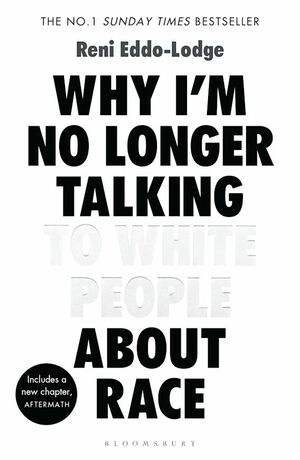Why I’m No Longer Talking to White People About Race – Reni Eddo-Lodge

As a white foster carer to mixed race children I am seeking to equip myself better for the task of raising children who will likely have experiences which have no correspondence to anything I have personally faced. This book is the first I have read, of several that have been recommended, after asking around for suggestions. I read it with a view to it exposing and starting to fill in my ignorance, following the advice of Dickens’ Ghost of Christmas Present “most of all, beware Ignorance.”
Reni Eddo-Lodge explains in the preface that the book that grew out of a blog, and it is written in that style, while quoting research to back up much of the material; I found the writing style helpful in communicating the emotion as well as the facts. As a white reader I was aiming to hear what was being said, and to avoid jumping to construct defensive counter-arguments in my head. Ironically, given the book’s title, Eddo-Lodge writes that she has spent more time than ever talking to white people about race since the blog’s and book’s publication and I hope that I am a better listener than those white people referenced in the book’s title who close down and become defensive whenever this subject is raised.
The book is written from a British perspective, noting that the black British experience differs from that in the USA, which is where much writing about race has come from. The opening chapters review black British history, showing that black people have lived in the UK and have been subject to racism for longer than is sometimes appreciated, and discuss how racism is so much part of ‘the system’ in the UK, discussing in particular the case of Stephen Lawrence.
The third chapter discusses ‘white privilege’ which I found very helpful. Of course I was previously aware of the term and I was willing to accept that I, as a white educated male, have it, but I’d not thought through what it is. So, Eddo-Lodge’s definition is helpful here:
an absence of the negative consequences of racism. An absence of structural discrimination, an absence of your race being viewed as a problem first and foremost, an absence of ‘less likely to succeed because of my race’… an absence of violence enacted on your ancestors because of the colour of their skin, an absence of subtle marginalisation and othering…
p.86
This is a useful starting point, and she later expresses it as a presence rather than absence: “I don’t mean that white people have it easy, that they’ve never struggled, or that they’ve never lived in poverty. But white privilege is the fact that if you’re white, your race will almost certainly positively impact your life’s trajectory in some way. And you probably won’t even notice it… The idea of white privilege forces white people who aren’t actively racist to confront their own complicity in its continuing existence.” p.87
Another helpful definition in this chapter concerns the difference between racism and prejudice. Eddo-Lodge writes, “There is an unattributed definition of racism that defines it as prejudice plus power. Those disadvantaged by racism can certainly be … prejudiced. Everyone has the capacity to be nasty to other people, to judge them before they get to know them. But there simply aren’t enough black people in positions of power to enact racism against white people on the kind of grand scale it currently operates at against black people.” p.89
Specifically interesting to me was the discussion, starting on p.108, of “white privilege in transracial adoption – when children of colour are adopted by white families“. Eddo-Lodge does not specifically mention foster care, but there are clear parallels with our experience as white foster carers committing to care for two mixed race children through their childhood, adolescence and young adulthood. She helpfully notes that:
There’s nothing to suggest that a black child… who is adopted into a white family, won’t be on the end of immeasurable love and support. But, having never experienced it, the parents might not be well equipped to deal with the racism their child will receive.
p.109
I hope that I am open to being educated and equipped to deal with, and to help our boys deal with, racism that they will very likely face in future. This book points to the need to do this actively; hopefully this book and others that are on my reading list will be part of that process.